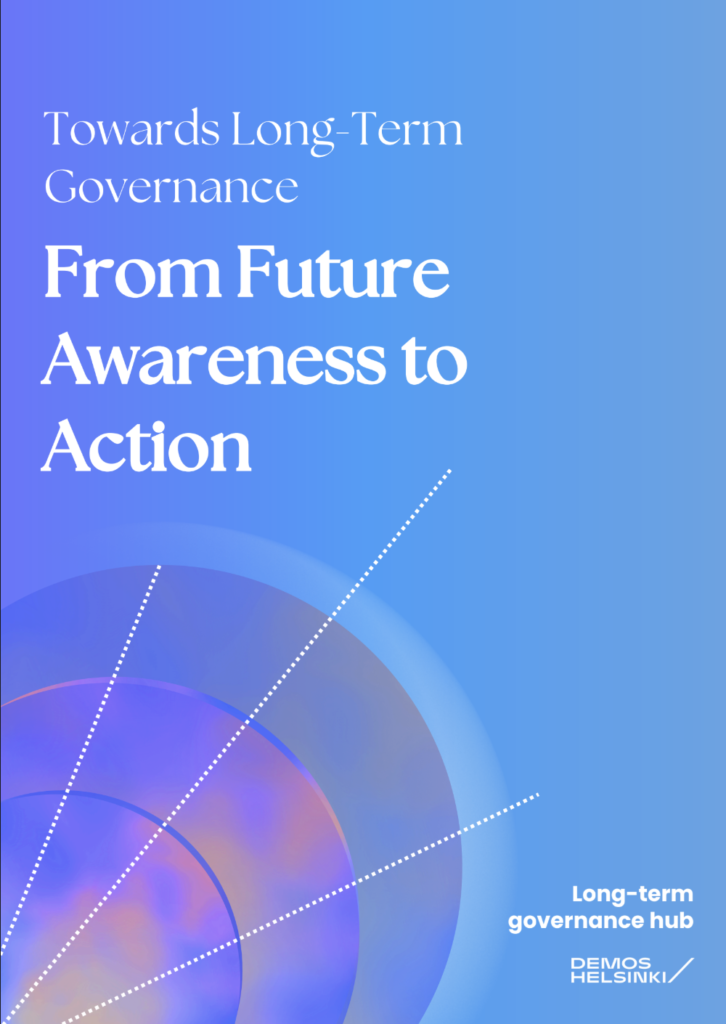How can countries strengthen their capacity for long-term governance and ensure that future generations are taken into account in decision-making? In this white paper, we highlight ways to promote anticipatory governance based on the views of key Finnish stakeholders. By translating the Finnish experience into a broader context, we aim to provide universally applicable strategies for advancing long-term governance and promoting intergenerational justice.
Political decision-making has often been characterised as short-sighted, with limited representation of future generations within our political systems. This is evident in the long- term challenges we face, such as the climate crisis and biodiversity loss. These issues further manifest as geopolitical crises, migration, technological competition, epidemics, and growing global inequality. Towards long-term governance – From Future Awareness to Action, a publication that draws from co-creation with government actors, citizens, researchers and NGOs, aims to identify and build consensus on ways to promote long-term governance, in line with the commitments of the UN Summit of the Future.
Overcoming political short-termism
The importance of long-term, more anticipatory decision-making is emphasised across several critical policy areas:
- Investments in RDI and its strategic priorities
- Demographic change and immigration
- External and internal security
- Future labour markets, education, and skills needs
- Social and healthcare costs and the wellbeing economy
- Carbon neutrality and climate policy
Following the UN Summit on the Future, governments must not only formulate bold visions, but also create robust frameworks for proactive, anticipatory governance that takes into account future generations. Even countries like Finland, that have long been recognised as a pioneer in future-oriented governance, still face challenges related to short-term pressures, foresight skills, and institutional capacities. These findings were also supported in a workshop with key government actors in Finland, which this publication was born out of.
Three perspectives for strengthening long-term thinking
In this publication, we present three ways to overcome the challenges of short-termism:
1) Embedding long-term considerations and foresight as core components of decision-making and good governance
2) Expanding futures literacy and the collective power to define futures
3) Strengthening our connection to future generations and recognition of their rights.
However, these three ways are not exhaustive. For instance, anticipatory governance also benefits from better welfare and sustainability indicators, and political consensus on long-term societal goals.
Steering global futures
In the face of growing global challenges, countries across the world have an opportunity to redefine what anticipatory governance means in practice. Throughout the publication, we have highlighted promising examples to strengthen future-regarding governance and the foresight ecosystem. These initiatives provide fertile ground for change towards better long-term governance.
This publication is part of Finland’s hub for long-term governance funded by the School of International Futures and the European Climate Fund, aimed at advancing the goals of the UN Future Summit in Finland. The hub’s activities are coordinated by Demos Helsinki, Fingo, and Sitra.
More information
Vera Djakonoff
Expert, Demos Helsinki
vera.djakonoff@demoshelsinki.fi
Atte Ojanen
Research Manager, Demos Helsinki
atte.ojanen@demoshelsinki.fi


Kohti pitkäjänteistä hallintoa – Tulevaisuustietoisuudesta toimintaan
Publication
December 12, 2024
Embedding a long-term view
Theme
December 3, 2024
Foresight and policymaking: lessons from Singapore and Finland
Post
September 26, 2022
Foresight enables to prepare for crises but also look beyond them
Post
April 2, 2020
Skopegy: Strategy in the 21st century
Publication
October 18, 2022
What do we talk about when we talk about strategic foresight
Post
August 29, 2018
Innovating urban development: Lessons from M4EG & moving beyond growth
Post
April 17, 2025
The anticipatory policy cycle: not just preparing for the future, but influencing it
Post
May 14, 2025
South Sudan builds long-term thinking while addressing present needs
Project
May 22, 2025
Young people and the future of Scotland: a participatory Horizon Scanning engagement
Publication
June 17, 2025
Finland, what is our promise for future generations?
Post
January 20, 2026